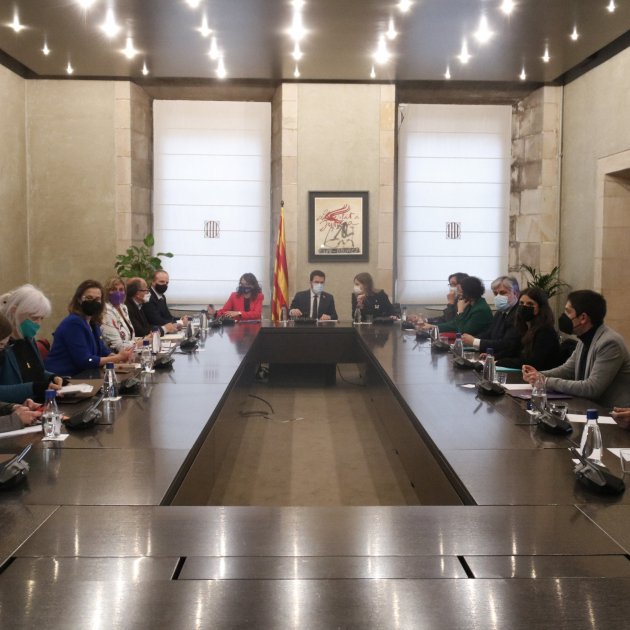Consensus, gratitude and constructiveness. Those were the key words that the Catalan government and opposition parties used to characterise the meeting that all parliamentary political groups held this afternoon - except the PP that gave its apologies and Vox that was not invited - with the president Pere Aragonès and the ministers Tània Verge and Victòria Alsina to address the impact of the Russian invasion of Ukraine. It was a second meeting to exchange proposals, for the executive to explain the measures implemented and those that are still to be developed: "It was a profitable meeting, exemplary, and with a will to reach an understanding from everyone," said government spokesperson, Patrícia Plaja, after the meeting.
Plaja stressed the importance of a proposal that Aragonès had already made last week: a demand to the Pedro Sánchez government to loosen its deficit targets from 0.6% to 1%, a measure that would allow the Generalitat to obtain another 750 million euros to dedicate to crisis measures. She also underlined that it is absolutely necessary for the required funds to arrive from the state in order to be able to put more measures in place - and "many more resources are needed than are now available", she said - and for that reason Aragonès also asked all parties present to support the government in its request to the Spanish executive to increase the deficit margin.
Plaja also explained that the will of the Catalan government is for these meetings to establish cross-party consensus to be repeated, and asserted that "more than half of the proposals" that have been sent by the groups are already being implemented, while most of the rest are not possible mainly due to competence issues. One of the most talked about, the 50% reduction in the price of public transport presented by the Comuns, is being studied.
The opposition leader and head of the Catalan Socialists, Salvador Illa, publicly thanked the meeting, at which he detailed that a general assessment of the proposals of the groups has been made. The Socialists expressed their "willingness to join and help" in this exceptional situation arising from the war, and expressed the need to rethink the management of European funds now that a new reality is emerging. However, they called for more ambition from the Catalan government to increase "the pace of development of renewable energy."
ERC's Meritxell Serret framed the meeting in a desire to respond to the public in a way that is "as cohesive as possible", and noted that ERC places great emphasis on Catalonia being a host country for Ukrainians fleeing the war, and that it is necessary, in addition to facilitating arrival, to make life easier for newcomers. A direct call to the head of the Spanish government was made by the spokesman for Junts, Albert Batet: "Less photos and more resources, Pedro Sánchez. Fewer promises and more deeds.” From the Comuns, David Cid has urged the Generalitat to speed up the response to the crisis, and to do so with measures that directly affect people's pockets, in particular the proposal to reduce the price of public transport by 50%: "It is a feasible measure," argued Cid. Finally, Nacho Martín Blanco from Ciudadanos also expressed gratitude for these meetings and assessed that the Catalan government's is reacting responsibly. He also put proposals on the table, such as the use of nuclear energy and natural gas to reduce energy dependence in Catalonia and the state with Russia, or the need to cut personal income tax to help middle- and low-income families.
